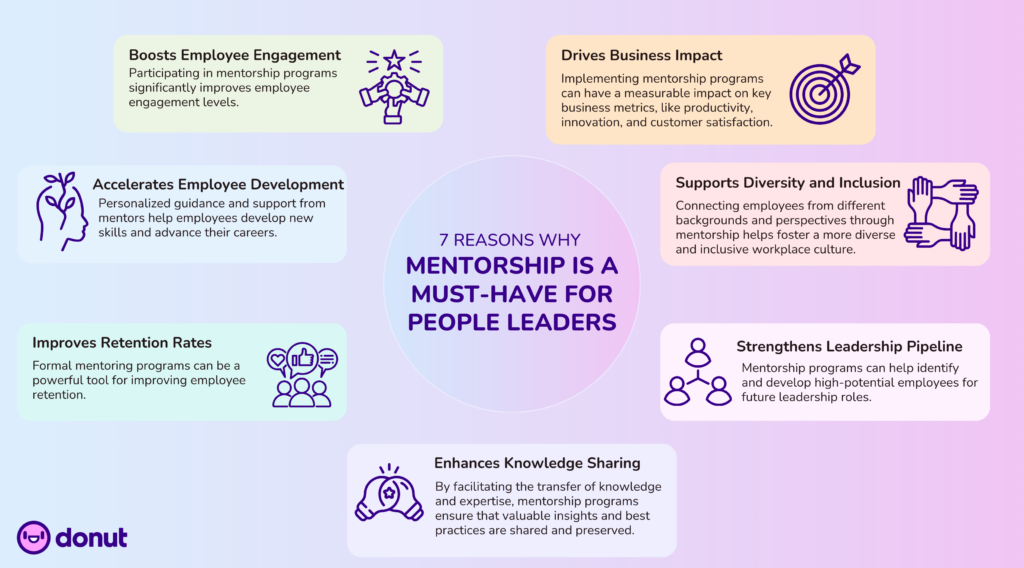Investing in mentorship programs is one of the most impactful strategies for driving employee engagement, development, and retention. This guide explores why mentorship should be a top priority for people leaders.

Boosts Employee Engagement
Mentorship programs are a powerful way to supercharge team members’ engagement in their work and with their colleagues, deepening their connection to the organization as a whole.
“A successful mentorship program engages all levels of the workforce and allows those who are further along in their careers to impart wisdom and counsel to others – giving them a new and meaningful way to contribute,” McKennah Williams writes for BDI. “High impact programs encourage mentors and mentees to have productive conversations and encourage a culture of learning.”
Improves Retention Rates
Research has shown that formal mentoring programs are a powerful tool for improving employee retention.
According to the CNBC/Survey Monkey Workplace Happiness Survey, 90% of employees who have a career mentor say they are happy in their jobs.
A 7 year case study at Sun Microsystems found that mentees exhibited a 72% retention rate and mentors a 69% rate—20+% over non-participants.
Supports Diversity and Inclusion
Different backgrounds, identities, and points of view lead to innovation and success. Mentorship deepens connections across teams, affirming a sense of belonging.
From Lucy Georgiades, Founder & CEO @ Elevate Leadership, “Facilitating direct, personal interactions between employees fosters empathy and understanding toward each other, and exposes both mentors and mentees to new viewpoints. These interactions can create an environment where different perspectives are acknowledged and valued and integrated into the organizational fabric.”
Accelerates Employee Development
Within a mentor/mentee relationship, team members experience a 1:1 dynamic dedicated to growth.
Via Ryan Carruthers for Radical Candor, “With the support of a mentor, mentees can stay focused on their careers, gain confidence, attain goals, and expand their networks. Having a mentor leads to self-discovery and helps you continue growing your career. Through their feedback, you’ll grow professionally and personally and be empowered to take your career where you want to go.”
Mentors also deepen their leadership skills, becoming better listeners and honing the feedback and guidance they provide.
Strengthens Leadership Pipeline
Identifying and developing high-potential employees is a key component of long-term organizational success. Formal mentoring programs provide an ideal supportive environment where future leadership skills can be honed.
“Most of the great leaders I know credit at least part of their success to devoted mentors or coaches who guided them through their careers,” Adam Rogers shares with Forbes, Leadership is rife with potholes and detours, and the ability to learn from someone else’s mistakes (or, even better, their successes) is truly invaluable. Consider establishing formal mentorship or coaching programs to help employees establish solid connections.”
Enhances Knowledge Sharing
Mentorship programs are a highly effective way to facilitate the transfer of knowledge and expertise within an organization.Through these intentional connections, valuable insights and best practices are shared and preserved.
As Matthew Reeves writes for Forbes, “Mentoring also encourages cross-departmental cooperation, dismantles silos and fosters a culture of ongoing learning. When an individual is selected as a mentor, it shows the organization sees them as an expert at their work. This recognition enhances the mentor’s reputation within the organization. It also encourages more employees, both within and outside their department, to seek their advice, leading to cross-functional collaboration.”
Drives Business Impact
Mentorship programs go beyond employee experience and lead to powerful outcomes of key business metrics, such as productivity, innovation, and even customer satisfaction.
Jayme Grzegorczyk writes for Morley, “The link between employee satisfaction and a positive customer experience can best be explained by the service-profit chain theory. Harvard University-developed service-profit chain is a business model that illustrates the link between employee satisfaction, customer satisfaction and business success.”
***
The evidence is clear mentorship programs are a must-have for people leaders looking to drive employee engagement, development, and retention. By investing in mentorship initiatives, organizations can unlock the full potential of their workforce and create a culture of continuous learning and growth.
To explore this topic further, we recently hosted a webinar featuring insights from AppDirect’s highly successful mentorship program. Watch the recording below to learn how they consistently receive rave reviews and discover practical tips for launching your own program!
Ready to start building a mentorship program that delivers real results? Check out our Prebuilt Journeys and discover the ability to automate the designing, implementing, and scaling a mentorship initiative tailored to your organization’s unique needs and goals.